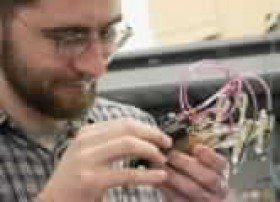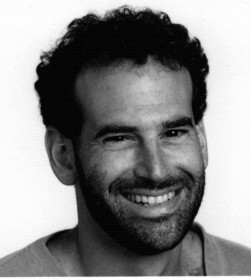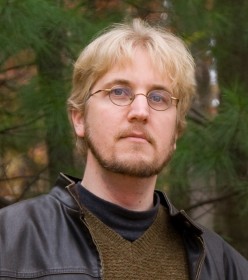Seminar
Design of Dynamic Multi-Modal Legged Locomotors
Event Location: NSH 1305Bio: Jonathan Clark received his BS in Mechanical Engineering from Brigham Young University and his MS and PhD. from Stanford University where he worked on the design of dynamic multi-legged running systems, including the Sprawl family of robots. From 2004-2007 he worked as an IC Postdoctoral Fellow on climbing robots at the [...]
Visual Recognition with Humans in the Loop
Event Location: NSH 1305Bio: Serge Belongie received the B.S. degree (with honor) in Electrical Engineering from the California Institute of Technology in 1995 and the M.S. and Ph.D. degrees in Electrical Engineering and Computer Sciences (EECS) at U.C. Berkeley in 1997 and 2000, respectively. While at Berkeley, his research was supported by a National Science [...]
Distributed Algorithms for Multi-robot Localization
Event Location: NSH1507Bio: Alberto Speranzon received a "Laurea" degree in Computer Engineering from University of Padova, Italy, in November 2000. In May 2006 he received a Ph.D. in Automatic Control from the School of Electrical Engineering, Royal Institute of Technology, Stockholm, Sweden. Between May 2006 and October 2006 he was post-doc at the same institute. [...]
Prospective, Intermittently-Assisted Autonomous Mobile Manipulation
Event Location: NSH 1305Bio: Seth Teller is a Professor in the Department of Electrical Engineering and Computer Science, and a Principal Investigator in the Computer Science and Artificial Intelligence Laboratory (CSAIL), at MIT. He received his B.A. in Physics from Wesleyan, and his M.Sc. and Ph.D. in Computer Science from U.C. Berkeley. Teller's research interests [...]
Visual Filters for Scene Classification
Event Location: NSH 1305Bio: Douglas Summers-Stay is a robot vision researcher for the Army Research Laboratory. He is finishing up his PhD in Computer Science at the University of Maryland, working with Yiannis Aloimonos. He recently published Machinamenta, an examination of creative machines before the invention of computers.Abstract: "Visual filters" is an approach to the [...]
Empathy in Virtual Agents and Robots
Event Location: 3305 Newell-Simon HallBio: Professor Ana Paiva is a research group leader at INESC-ID and an Associate Professor at Instituto Superior Técnico, Technical University of Lisbon. She is well known in the area of Virtual Agents, Artificial Intelligence Applied to Education and Affective Computing. After her PhD in the UK (University of Lancaster), she [...]
Understanding Scenes With Superpixels and Object Detectors
Event Location: NSH 3305Bio: Svetlana Lazebnik received her Ph.D. in 2006 at the University of Illinois at Urbana-Champaign. From 2007 to 2012, she was an assistant professor of computer science at the University of North Carolina at Chapel Hill. As of January 2012, she has moved back to UIUC as an assistant professor. She is [...]
Grounding Natural Language in Robot Control Systems
Event Location: NSH 1305Bio: Dieter Fox is an Associate Professor in the Department of Computer Science & Engineering at the University of Washington, where he heads the UW Robotics and State Estimation Lab. From 2009 to 2011, he was also Director of the Intel Research Labs Seattle. He currently serves as the academic PI of [...]
Capturing Light: The History of Imaging
Event Location: NSH 1305Bio: Roger Cicala received his M. D. in 1986. He spent 12 years (not all in a row) as Associate Professor of Medicine at the University of Tennessee. In the interim he practiced medicine, worked in pharmaceutical research, and for the Drug Enforcement Agency. In 2005 he left medicine to make a [...]
Complementary Flyover and Rover Sensing for Modeling of Planetary Features
Event Location: GHC2109Bio: Heather Jones is a PhD student at the Robotics Institute. Before coming to Carnegie Mellon, she earned bachelors degrees in engineering and computer science from Swarthmore College and worked for nearly three years at NASA's Johnson Space Center. Abstract: This talk presents complementary flyover and surface exploration for reconnaissance of planetary point [...]









